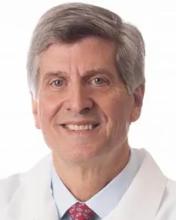To our School of Medicine community,
I am writing to share the sad news that longtime professor Dr. Robert A. Salata died yesterday. Beyond his legacy as a world-renowned infectious diseases physician and researcher at Case Western Reserve University School of Medicine and University Hospitals (UH), Bob also will be remembered for the generations of clinicians he mentored and the countless patients he helped.
Bob has long held ties with Case Western Reserve University School of Medicine and University Hospitals, starting with earning his MD from our school and then completing his internship and residency in internal medicine at UH. After a fellowship at the University of Virginia Medical Center studying infectious disease, he returned to CWRU as an instructor and UH as chief resident in 1985.
In his 36 years on the faculty of Case Western Reserve University School of Medicine, Bob served in a variety of roles, including as the John H. Hord Professor and chairman of the Department of Medicine and founding director of the Infectious Diseases and Immunology Institute. He also served in a joint role as chief of the Division of Infectious Diseases and HIV Medicine for nearly 20 years at CWRU and University Hospitals. At UH, Bob was the STERIS Chair of Excellence in Medicine, as well as the physician-in-chief, distinguished physician, senior attending physician, chair of chairs and medical director of infection control and prevention at UH Cleveland Medical Center.
But more important than his extensive titles was the difference he made as a physician, educator, mentor and colleague. I was fortunate to work closely with Bob over many years, as division chief, during my tenure as UH Seidman Cancer Center director and even more so as dean while he was chair of the UH clinical chairs group. His equipoise, honesty and even-handed approach even under stress were a lesson to us all.
Bob’s local and national leadership during the COVID-19 pandemic helped us all through an incredibly difficult time. He was a tireless educator of physicians and the public alike, making numerous appearances in local and national media, and leading webinars on COVID-19. He led the clinical trial for the Pfizer COVID mRNA vaccine in Northeast Ohio, and coordinated weekly webinars for infectious disease physicians around the region.
In addition to his incredible impact locally, Bob cared deeply about improving care around the world. One of his most profound contributions globally was as principal investigator in HIV/AIDS research for the Uganda-Case Western Reserve University Research Collaboration since 1997. For the past four years, we have been co-primary investigators on a large U54 grant study on lung cancer and HIV in Uganda and Tanzania. We are anticipating enhanced facilities there to support ongoing research and education programs that were largely Bob’s creation. His research included the epidemiology of infectious diseases, clinical trials of new therapeutic agents for emerging infections and clinical HIV/AIDS research related to anti-retrovirals, as well as the epidemiology and prevention of HIV. His work on clinical trials resulted in continuous funding for these activities from the National Institutes of Health.
Our deepest sympathies are with Bob’s family during this difficult time. Many of us, including myself, had close relationships with Bob over the years; please make sure you are taking the time you need to process this loss. Students who would like support during this time are encouraged to contact University Health and Counseling Services at 216.368.5872. This line is staffed by a counselor 24 hours a day, seven days a week. Faculty and staff can access counseling at any time by calling IMPACT Solutions at 1.800.227.6007.
More information about Bob’s efforts at Case Western Reserve, University Hospitals and our broader communities will be shared in The Daily. Information on services will be provided as soon as it becomes available.
Bob’s impact on all of us will long be remembered; I hope we each can find ways to ensure his memory continues on in our work.
Stan Gerson, MD
Dean, CWRU School of Medicine


